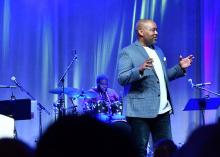Mennonite Church U.S.A. has released the completed report from its denominational survey, “The Mennonite Experience: MC USA Membership Study 2021-22.”

The 85-page report revealed that members have deep commitments to their faith, a passion for peacebuilding, a heart for service and close congregational ties. They also desire denominational leaders to focus on ministries that centre on Jesus (51 percent), embrace diversity, and emphasize peacemaking and outreach to others (88 percent).
The denomination’s Executive Board commissioned the study to provide a snapshot of what it means to be a Mennonite and a member of MC U.S.A. The final report captured 2,276 survey responses and 63 follow-up interviews, representing voices from all 16 conferences.
“This survey provides us with important insights, especially as we consider the role of program agencies and the priorities of the denominational staff,” executive director Glen Guyton said. He added that, while the data may not be entirely representative of all the lived experiences of MC U.S.A.’s members, the respondents who participated are people that are engaged and committed church members.
The survey features four chapters that focus on membership demographics, defining what it means to be Mennonite, experiences and understanding of the role of the denomination, and the tenets and philosophies that drive membership.
Outreach and missions
Across the board, participants (88 percent) agreed that outreach is important. Despite this, “evangelizing nonbelievers” was ranked last among the personal faith commitments, with only 18 percent of respondents saying it is “very important.” The preferred mode of outreach for 70 percent of respondents was service.
“We need to do better at reaching out and sharing our faith locally,” said Guyton. “Our approach to missions is not just international. We must become missional people that impact the community. There is a desire for that in our denomination.”
Congregational life
Survey data showed that the local church plays an important role in the lives and faith of members. Seventy-eight percent of respondents said that organized church matters to them. Participants spoke positively about their congregations, saying that they felt their congregations care about what is happening in their personal lives (85 percent), help them deepen their relationship with God (89 percent), and strengthen their faith through connection (87 percent).
Guyton affirmed these results, saying: “We need strong congregations with well-equipped leadership. The national body is there to serve the congregations and its members, not the other way around. We must have strong, relevant local churches.”
Denominational leadership
Respondents view the essential activities of the denomination as working for peace and justice (68 percent); sharing God’s love in word and deed (65 percent); partnering globally (34 percent); and educating (25 percent) and equipping members (24 percent). Survey responses and interviews show that members want the denomination to move toward a more progressive and innovative approach to church (58 percent); to be committed to antiracism (93 percent); to diversify and include the marginalized in meaningful ways, and to advocate for migrants and refugees, regardless of documentation status (87 percent).
Being Mennonite
Most respondents (56 percent) defined a Mennonite as “one who agrees with Mennonite theology.” When asked about their personal faith commitments, respondents listed “Following Jesus in daily life” (84 percent), “Expressing Christian love in all relationships” (80 percent), and “Peacemaking and nonviolence” (76 percent) among their “very important” personal faith commitments. The majority (77 percent) said they engage with the Anabaptist/Mennonite faith because of the church’s mission and values.
“A key insight from this data is that we must stick close to our Anabaptist roots and put Jesus at the centre of all we do,” said Guyton. “We have a special call as Anabaptist Christians to focus on the life of Christ. Without that distinctive, any work we do loses its true power.”
Guyton presented the survey to the Constituency Leaders Council on Oct. 21. In his presentation, he said: “People want to serve. People want to get engaged. People want to do ministry where they get their hands dirty, where it touches other people’s lives.
“Make sure you’re including some type of service, some type of engagement, so people can see the work that you are doing,” he said to the group of leaders from MC U.S.A. agencies, conferences and constituency groups. “Get busy doing work in your local community,” he added.
Guyton identified next steps that leaders should consider in reference to the survey results. These included:
- As we become more diverse, we have to change our systems and paradigms.
- Lean into the basic tenants of Anabaptism, and not popular religious rhetoric.
- Get busy doing ministry work in the community and abroad.
- Do ministry in smaller circles. Focus on local ministry and contextual needs.
Visit mennoniteusa.org/who-are-mennonites/denominational-survey-results to download the full report.



Add new comment
Canadian Mennonite invites comments and encourages constructive discussion about our content. Actual full names (first and last) are required. Comments are moderated and may be edited. They will not appear online until approved and will be posted during business hours. Some comments may be reproduced in print.